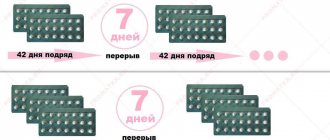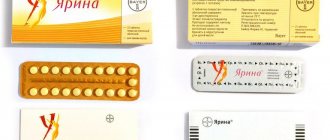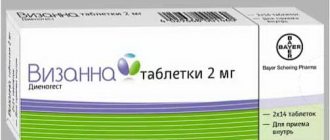Introduction of NuvaRing
NuvaRing for endometrial growth is prescribed by a gynecologist after a thorough examination. You don't have to go to the doctor to get a contraceptive. You can do this yourself at home. To do this, you can sit down and spread your knees to the sides, stand up or lie down. The ring is compressed and placed in the vagina in a convenient location.
Administration is carried out once a month, which is very convenient. If for some reason the contraceptive falls out, it is washed under water at room temperature and reinserted.
Medicines for the treatment of endometriosis: homeopathic, Nuvaring ring
Last update: 10/07/2019
If endometriosis is diagnosed, treatment with drugs at the initial stage is quite capable of leading to the patient’s recovery without the use of surgical methods.
Medications for the treatment of endometriosis are part of complex therapy. Surgery may not be necessary if you seek medical help in time and start appropriate treatment.
This is also important because endometriosis over time leads to the development of adhesions, the result of which is infertility.
Contraindications
Contraindications include:
- arterial and venous thrombosis, thromboembolism;
- all kinds of cerebrovascular accidents (angina pectoris, heart attacks, strokes, etc.);
- abnormalities related to the heart;
- deficiency states of protein C, S, antithrombin Z;
- the presence of antiphospholipid antibodies, hyperhomocystenemia;
- serious liver pathologies (including the presence of neoplasms);
- the period of bearing and feeding a child (the components included in NuvaRing may partially pass into breast milk);
- systematic migraine attacks;
- neurasthenia;
- high blood pressure;
- a history of diabetes mellitus, in which there are vascular lesions;
- pancreatitis;
- hypertriglyceridemia;
- the presence of various hormone-dependent malignant formations (for example, in the breast area);
- periodic or regular bleeding of unknown nature from the genitals;
- operations followed by a long recovery period;
- age category of women who are over 35 years old and are heavy smokers (more than 15 cigarettes per day);
- individual intolerance to the components present in the drug.
Relative contraindications for NuvaRing include the presence of:
- thrombotic lesions in close relatives;
- excessive body weight, tendency to obesity;
- varicose veins with thrombophlebitis;
- dyslipoproteinemia;
- uncomplicated diabetes mellitus;
- epileptic syndrome;
- pathologies associated with intestinal flora (ulcerative colitis, Crohn's disease);
- sickle cell anemia;
- chloasma;
- uterine fibroids;
- fibrocystic mastopathy;
- genital prolapse;
- hernias;
- systematic constipation;
- adhesions in the vaginal area;
- smoking;
- acute disease or exacerbation of a chronic one.
Before using this treatment method, you must undergo diagnostics at a medical center. First, the doctor examines the patient’s medical history, excludes all contraindications and takes into account the risks. In the future, you need to undergo examinations every six months to minimize the occurrence of complications and undesirable consequences.
Nuvaring ring and endometriosis – Endometriosis
If endometriosis is diagnosed, treatment with drugs at the initial stage is quite capable of leading to the patient’s recovery without the use of surgical methods.
Medications for the treatment of endometriosis are part of complex therapy. Surgery may not be necessary if you seek medical help in time and start appropriate treatment.
This is also important because endometriosis over time leads to the development of adhesions, the result of which is infertility.
General concepts about the treatment of endometriosis
Official medicine considers hormonal therapy to be the only option for conservative treatment of endometriosis.
Hormonal medications for endometriosis affect the main links in the pathogenesis of this disease, since endometrioid tissue reacts to female sex hormones in the same way as normal tissue of the inner layer of the uterus.
Another side of conservative treatment of endometriosis is symptomatic therapy aimed at reducing the manifestations of the disease, but not the cause (painkillers, hemostatic agents).
It is believed that conservative therapy is not highly effective. And when it comes to severe and advanced cases, you should not expect a significant result from it. In such cases, the only effective way to solve the problem remains: surgery.
There is another category of drugs that are used to treat endometriosis - homeopathic drugs. Traditional medicine is particularly skeptical about such substances. The homeopathic school teaches that you can only fight a problem by doing what causes its symptoms. That is, the principle “like cures like” works.
Another principle that homeopathy uses is the extreme dilution method. Its essence is that the active substance is subjected to multiple dilutions. The number of these dilutions is so large that the active substance simply does not remain in the solution. In this case, they claim that some elusive substance remains from it, which produces all the expected effects.
The only reasonable explanation that such “drugs” can cure is the placebo effect. That is, the imaginary result occurs either as a result of self-hypnosis or suggestion from a homeopathic doctor. The result of such self-experiments is always one thing: severe advanced cases of the disease that no hormonal drugs or surgeries can cure.
First of all, get rid of pain
Since one of the most painful symptoms of endometriosis is pain, treatment is aimed at reducing pain. The most commonly used means for this purpose include:
- Anilides (the well-known Paracetamol).
- Nonsteroidal anti-inflammatory drugs (Ibuprofen, Celecoxib).
- Combined oral contraceptives (Non-Ovlon, Mercilon).
- Progesterone preparations (Progestogel, Utrozhestan).
The last 2 groups are hormonal drugs. The analgesic effect is one of a whole range of their actions.
Non-steroidal anti-inflammatory drugs for endometriosis act on specific biochemical processes, which result in the release of large amounts of substances leading to pain. That is, these medicinal substances reduce the symptoms, but do not in any way affect the underlying cause. In addition, their long-term use is fraught with serious consequences:
- Ulceration of the mucous membrane of the stomach and duodenum.
- Violation of the hematopoietic system.
- Development of toxic hepatitis.
- The occurrence of nephritis and chronic renal failure.
Drugs to combat the cause of the disease
Since the main cause of the development of endometriosis is considered to be hormonal disorders, it is logical to use hormonal drugs aimed at restoring disrupted relationships in the endocrine system. No matter how effective medications based on female sex hormones are, they cannot completely eliminate endometriosis.
Drug treatment of this problem was the main method at a time when laparoscopic methods of intervention were not invented. There are not many drugs that have been proven to be more effective than placebo in large studies:
- Progesterone preparations and its analogues.
- Monophasic combined oral contraceptives.
- Gonadotropin releasing hormone agonists.
- Synthetic androgens (Danazol, Gestrinone).
Despite the fact that the drugs in these groups have proven effective compared to placebo, no convincing evidence has been found that any one group is more effective. Therefore, the choice of one or another drug depends on concomitant diseases and individual tolerance of the active substances.
Progesterone and its analogues
Treatment of uterine endometriosis is possible with the use of progesterone-type drugs. Substances of this group are an analogue of the hormone that is synthesized by the corpus luteum of the ovaries.
They have a beneficial effect on the formation of normal secretory endometrium. There are many forms of release of these medications: capsules, intravaginal suppositories, solutions for intramuscular administration.
The method of administration, dose and mode of use is developed by the attending physician.
It is worth remembering that there are a number of contraindications to the use of progesterone drugs:
- Allergic reactions to drug components in the past.
- Liver failure.
- Tumor diseases of the mammary glands or genital organs.
- Failed abortion in the past.
- Increased blood clotting.
- Cerebral circulation disorders.
- Porphyria.
The presence of any contraindications must be reported to the doctor. In addition, progesterone preparations can interact with other medications: some antibiotics and antifungals, diuretics and antiepileptic drugs. This information is also necessary when choosing a drug regimen.
Contraceptives in the treatment of endometriosis
Hormonal contraceptives act on disrupted links in the body's complex hormonal system.
Their use may be especially effective if progesterone drugs are contraindicated.
Combined oral contraceptives (COCs) act on the central organ of the endocrine system - the hypothalamus, leading to suppression of the production of follicle-stimulating and luteinizing hormones.
Thus, the structure of both normal endometrium and endometrioid tissue changes. The inner layer of the uterus stops at a stage of development that eliminates the possibility of pregnancy. The contraceptive effect of the drugs is based on this. And endometrioid tissue undergoes reverse development.
You should not use COCs if you suspect pregnancy, severe liver and cardiovascular diseases, diabetes mellitus, arterial hypertension and breast tumors. A special contraindication is smoking over the age of 35 years.
Another one in terms of mechanism and application of action is the NuvaRing ring. This is also an estrogen-containing drug, but its difference is its predominantly local effect. The ring is capable of gradually releasing the active ingredients: etonogestrel and ethinyl estradiol.
NuvaRing is a new method of delivering hormonal substances to a woman’s body, which gives this product a number of advantages. The ring is inserted once a month, which makes it easier to use and eliminates skipping medications.
In addition, the release of hormones locally, without passing through the systemic circulation, significantly reduces the incidence of side effects.
Gonadotropin releasing hormone agonists
The essence of the effect of drugs in this group is that they reduce the sensitivity of the cells of the female genital organs to the regulatory hormones of the hypothalamus and pituitary gland. As a result, the ovaries do not receive signals to produce estrogen.
Accordingly, the concentration of estrogen decreases. Endometrioid tissue is very sensitive to this type of hormone. Therefore, limiting their secretion helps reduce the manifestations of endometriosis and can lead to long-term remission or even cure.
Drugs in this group include Decapeptyl Depot, Diferelin. Contraindications to their use are: osteoporosis, pregnancy and breastfeeding. One of the biggest disadvantages of drugs in this group is the method of their introduction into the body: all of them are injectable drugs and are administered subcutaneously or intramuscularly.
Androgens and their synthetic analogues
The name of this group of drugs comes from the Greek word “andros”, meaning “man”. Medicines in this group are derivatives of the male sex hormone testosterone or its metabolites. The mechanism of action is vaguely reminiscent of that of gonadotropin-releasing hormone agonists.
The primary point of action is the pituitary gland. Under the influence of drugs of this group, the production of luteinizing and follicle-stimulating hormones is significantly reduced. As a result, ovarian function is suppressed and endometrial atrophy occurs. The last action is used as the expected effect for endometriosis.
Under the influence of the drug, endometrioid tissue and healthy endometrial tissue are damaged. But a significant reduction in pain and the number and size of endometriotic lesions is achieved. However, this effect is reversible. Therefore, drugs in this group are used primarily for the purpose of preoperative preparation and postoperative therapy.
Androgen analogues are prohibited from being used during pregnancy and breastfeeding, liver and kidney pathologies, chronic heart failure and diseases of the blood coagulation system.
Modern medicine has a wide selection of drugs that can be prescribed to women with endometriosis. Not all of them are suitable in a given situation. That is why close, confidential contact with a specialist in this field is necessary. And the earlier the disease is diagnosed, the greater the chances of getting rid of it.
Sources used: healthladies.ru
Nuvaring. Reviews
Total messages: 4012
01/24/2014, Tatyana
Good afternoon! I am 44 years old, I have been using NuvaRing for 4 years. The doctor prescribed it for prevention purposes, since I have endometriosis, fibroids and polycystic disease.
During the use of the drug, fibroids and endometriosis “stay in place”, menstruation is regular.
But all the side effects listed in the instructions began to bother me: constant migraine, blood vessels, blood pressure, heart, gastrointestinal tract, enlarged liver, excess weight, lack of libido, tearfulness, nervousness, etc.
Should I continue to use this drug or find an alternative?
- Evgenia34 (consultant):
Tatyana, you should first see a doctor to assess your true state of health. The doctor will determine whether your complaints are related to Nuvaring, or whether there are age-related changes in the body.
01/23/2014, Ekaterina
Good afternoon again! On January 15, 2014 I asked a question, but I didn’t quite understand the answer. I will repeat (with your answer):
Good afternoon Tell me please, is the Nuvaring ring an abortable contraceptive? those. If ovulation is not “blocked,” does this ring prevent the fertilized egg from attaching to the uterine cavity? (does it have such an “effect”?) Thanks for the answer
Evgeniya34 (consultant): Ekaterina, no, Nuvaring does not have an abortifacient mechanism. Why is ovulation not blocked when wearing HP regularly?
Question: In the description on the website about Nuvaring, the Pearl Index is 0.96, the remaining 0.04 (4%) are fertilized eggs and, as a result, pregnancy. Those.
Logically, ovulation is not 100% blocked? also, the intensity of menstrual-like bleeding decreases - as far as I understand, hormones thin the endometrium? It turns out that Nuvaring still has an abortifacient effect? Help me to understand.
- Evgeniya34 (consultant):
Ekaterina, an abortive effect is when there was unprotected sexual intercourse during which conception occurred (for example), but the woman takes some kind of drug and the pregnancy fails. If you get pregnant during sex and decide for the FIRST TIME AND ONLY ONE TIME to install Nuvaring for an abortifacient effect, then nothing will work out for you and the pregnancy will not fail. Nuvaring hormones act in three directions: they block ovulation, thicken the buccal mucus, and thin the endometrium, making it unsuitable for implantation of the fertilized egg.
01/23/2014, NNata
Pay attention. Using Nuvaaring is dangerous. The January issue of Vanity Fair magazine published an article about the death of a 24-year-old girl, which occurred as a result of using Noaring. Here is a link to the article itself. Unfortunately, it is in English, but no one has canceled Google Translator.
https://www.vanityfair.com/politics/2014/01/nuvaring-lethal-contraceptive-trial
Source: https://sem-ochag.ru/endometrioz-simptomy/kolco-novaring-i-endometrioz
Side effects
- vaginal infections, in the form of vaginitis or candidiasis;
- cystitis;
- cervicitis;
- excessive and sudden increase in body weight;
- the occurrence of infections in the urinary tract;
- the appearance of an increased desire to eat food;
- depressive states;
- lack of sexual desire;
- sudden change of mood;
- headache;
- presence of dizziness;
- loss of vision;
- the appearance of hot flashes;
- pain in the abdominal area;
- attacks of nausea and vomiting;
- flatulence and bloating;
- constipation or diarrhea;
- various types of rashes occur on the skin (acne, urticaria, eczema, alopecia, etc.);
- itching on the skin and genital area;
- muscle spasms, pain in the arms and legs;
- the presence of pain in the lumbar region, pelvic area and abdomen;
- the mammary glands become rough and sore;
- there is a change in copious vaginal discharge;
- PMS syndrome;
- a woman gets tired quickly;
- there is swelling on the face, arms and legs;
- dryness and burning of the mucous membranes in the area of the vagina and vulva is felt;
- during sexual intercourse, the partner may feel a foreign body in the vagina and the woman herself can feel it, even in everyday life (but the latter is rarely observed);
- sometimes the NuvaRing falls out;
- in rare cases, the occurrence of menorrhagia, metrorrhagia, fibrocystic mastopathy, amenorrhea, dysmenorrhea and ectropion of the uterus is observed.
Before using Nuvaring, read the instructions.
Positive effect of NoahRing
As mentioned above, this remedy not only serves as a contraceptive, that is, it protects against sudden pregnancy, but also has a positive effect on the general condition of the woman. After installing the ring, the woman feels:
- reduction of pain;
- reduction of menstrual bleeding.
All of the above will be present only if the diagnosis is correctly established and in the absence of contraindications. If any discomfort occurs, you should immediately tell your doctor about it, who will most likely cancel NuvaRing and prescribe another drug that will also be effective for endometriosis.
Mode of application
The drug in question is intended to be administered intravaginally. It is quite possible to do this yourself. To do this, just take a position that is comfortable for you. It can be anything: lying down, standing, raising one leg, sitting. In order to start using the product in question, you need to squeeze it and insert it into the vagina. There is no exact position in which the ring must be inside for the contraceptive effect to remain. The only condition is the patient’s personal physical and psychological comfort. Therefore, the ring should be placed in such a way as not to cause discomfort to the woman, including during sexual intercourse. Once the ring has been inserted, it can remain inside the vagina for up to three weeks. If the ring is accidentally removed from the vagina (for example, while a woman is removing a tampon), it should be rinsed with warm water and immediately reinserted. After twenty-one days (the day of the week should coincide with the day the product was first introduced), the ring must be removed. If a woman still wants to use contraceptives, then after seven days she inserts a new ring. During these seven days, menstrual-like bleeding must begin (usually this happens two to three days after the previous ring was removed). The following remedy should be administered according to the schedule, without focusing on the end of the described bleeding.
Do not use the Nuvaring ring if you suspect you are pregnant. First rule out the presence of this condition. If in the previous menstrual cycle the patient did not use contraceptives that contain hormones, then the ring must be inserted on one of the first five days of the cycle. Over the next week, you should also use additional contraceptives, in particular barrier ones (for example, condoms). If, in the previous menstrual cycle, hormonal contraceptives were still used, then the ring should be inserted on the first day after the required seven-day break or the next day after the last placebo pill was taken (taking placebo pills for some drugs of this kind replaces the break ).
What can be said about those who in the previous cycle used mini-pills or other hormone-containing drugs containing only progestogens (the same applies to intrauterine devices containing progestogen)? You can use the remedy in question on the same day that you received the last dose of the hormone, whether it is removal of the intrauterine device or injection of progestogens. In the first week, it is important to use a barrier method of contraception, since when switching from progestogen contraceptives to the Nuvaring ring, the risk of pregnancy remains in the first seven days.
If an abortion was performed in the first trimester of pregnancy, then the contraceptive in question can be used immediately after the procedure (there is no need to use any other methods of contraception). If an abortion was performed in the second trimester, a miscarriage occurred, or childbirth occurred, then it is recommended to use the Nuvaring ring only starting from the fourth week after the incident. If the use of this contraceptive is started later, condoms must be used over the next week.
What if the patient forgot to insert the ring after a seven-day break? She should do this as soon as possible. However, for the next seven days it is important to use additional barrier methods of contraception, such as condoms or a vaginal diaphragm. What if the ring was accidentally removed from the vagina? If it was outside the genital tract for more than three hours, then its contraceptive effect was significantly reduced. The ring must be reinserted immediately. However, it is also important to use barrier methods of contraception (for example, condoms) over the next week. If this is the third week since you started using this ring, then it is important to ensure that it remains in the vagina for more than twenty-one days from the moment it was first inserted. The next remedy must be administered one day after the end of use of the previous one.
If for some reason the patient does not remove the drug in question in a timely manner, it is important to remember that it remains effective only for four weeks after it was first introduced. Once the woman remembers that it is necessary to remove the ring, this should be done immediately. After a break of one day, you can introduce a new remedy. If you have been using the ring for more than four weeks and have had unprotected sex since then, it is important to rule out pregnancy before starting to use the next ring.
If you have taken the required seven-day break between periods of using the product in question, but the expected menstrual-like bleeding does not begin, then it is important to rule out pregnancy (by examination by a specialist) before inserting a new ring. You can take a home pregnancy test or take a blood test for hCG.
According to reviews, the Nuvaring vaginal ring is used by some to change the time of menstruation. To do this, you can simply reduce the number of days between using the next ring by as many days as necessary for the desired shift in menstruation. If the break is short enough, the chances are high that natural monthly bleeding will not begin at all. However, this means that minor bleeding may occur during the next cycle.
In order to delay menstruation, the patient can start using the next ring without taking the required seven-day break. When the next ring is inserted, you should not be surprised by minor spotting that may occur throughout the next cycle. This is the body's reaction to the existing hormonal background. Next, it is important to insert the rings, observing all the necessary seven-day breaks.
To prevent other people from coming into contact with your used ring, it should be carefully bagged and disposed of immediately with other household waste.











